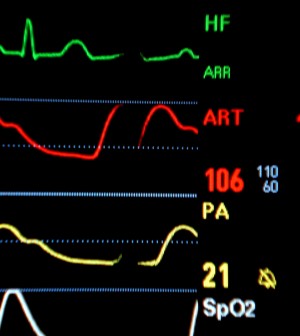- Could Your Grocery Store Meat Be Causing Recurring UTIs?
- Are You Making This Expensive Thermostat Error This Winter?
- Recognizing the Signs of Hypothyroidism
- 10 Strategies to Overcome Insomnia
- Could Artificial Sweeteners Be Aging the Brain Faster?
- Techniques for Soothing Your Nervous System
- Does the Water in Your House Smell Funny? Here’s Why
- Can a Daily Dose of Apple Cider Vinegar Actually Aid Weight Loss?
- 6 Health Beverages That Can Actually Spike Your Blood Sugar
- Treatment Options for Social Anxiety Disorder
Early Weight Loss With Parkinson’s May Be a Red Flag

People who lose weight in the early stages of Parkinson’s disease may have a more serious form of the movement disorder, according to a new study.
Parkinson’s is a chronic and progressive disease marked by tremors, impaired coordination, and slowness and/or stiffness. The cause and cure are unknown.
Weight loss is common in Parkinson’s patients, according to background information from the study. But the study findings, published online Jan. 11 in the journal JAMA Neurology, suggest that weight loss in the early stages of the disease could be a red flag for doctors.
“I suspect we may be looking at several subtypes of this disease,” study lead author Dr. Anne-Marie Wills, of Massachusetts General Hospital’s neurological clinical research institute, said in a hospital news release.
“The patients who experience early weight loss appear to have a more severe, systemic form of the disease, possibly due to involvement of the neuroendocrine system or the gastrointestinal nervous system, while those who gained weight may have a milder form of the disease,” she explained.
For the study, conducted between 2007 and 2013, the researchers examined data from more than 1,600 people who had been diagnosed with Parkinson’s within the previous five years.
Weight remained stable among 77 percent of the patients, while 9 percent lost weight and 14 percent gained weight during the study period.
Compared to those whose weight remained stable, patients who lost weight had faster worsening of symptoms, the study found. Worsening of symptoms was slowest among patients who gained weight. Rates of survival were similar for all three groups, but that may be because all were in the early stages of the disease, the researchers said.
It’s not known if maintaining or increasing weight could slow the progression of Parkinson’s.
Also, the study only found an association between early weight loss and worsening symptoms, not a cause-and-effect relationship.
“Since this is just the first observation of this association in Parkinson’s, we cannot recommend any changes to standard clinical care right now,” said Wills, who’s also an assistant professor of neurology at Harvard Medical School.
“But in my own practice, I try to prevent weight loss in patients, and I would recommend providers to be attentive to weight changes in their patients, even early in the disease,” she said.
More information
The Parkinson’s Disease Foundation has more about Parkinson’s disease.
Source: HealthDay
Copyright © 2026 HealthDay. All rights reserved.










